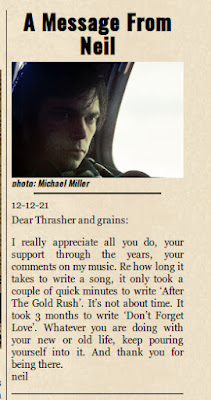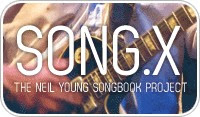Comment of the Moment: The Difference between Art and Entertainment:

Neil Young
Deja Vu Press Conference - Berlin, February, 2008
In the aftermath of the 2009 Bridge School concerts there's been a lot of discussion about Neil Young's approach to recording and performing in this phase of his career. This is somewhat similar to the whole debate that raged around whether Neil following his muse was such a good idea given the critical reaction to Fork in the Road.
So here's the Neil Comment of the Moment on his "Imperfect Nature" by the always insightful D.I. Kertis:
When it comes down to it, Neil Young is about being real.
My impression, from his work and from interviews, is that what he abhors and always tries to avoid is being *fake*: manufacturing a product that expresses something other than how he feels and what he wants to do. With each new project he undertakes, it seems that Neil runs these constants through an equation. This is why we have Everybody Knows this is Nowhere; Harvest; Tonight's the Night; Rust Never Sleeps; Trans; Landing on Water; Sleeps with Angels; Are You Passionate?; Greendale; Living with War; even the Archives. All of these are expressions of Neil at the time they were created.
Even album like Trans, although it is not organic in that it utilizes digital equipment to distort Neil's voice, it is very personal and captures what Neil wanted to say at that time as he wanted to say. Similarly, Are You Passionate? has a very polished sound because of the style of music Neil wanted to express himself through. All of this work is in fact organic in the sense that it comes from his mind and soul.
One of the most consistent and pleasing elements for me of Neil's catalogue is that, unlike other stars, he is never afraid to be human: to allow his uncertainty and indecision show. He doesn't pretend to have answers if they aren't there. In fact, he encourages the listener to answer the questions he poses for themselves. His answers, when supplied, are given as one point-of-view. He doesn't profess to provide the only correct perspective. And if he's feeling down or insecure, or if he doesn't know where he's headed next, he'll say so-- in whatever way suits him. He's not about putting on any sort of "show" or artificial exterior but about honest expression of the self.
Which comes back to Greg's comment: "The art is not about you." Well, I for one don't think any art is really about *you* unless you create it. Art is by its nature an expression of the person who creates it one way or another. The audience may relate on some intellectual or emotional level--that is another essential element of art, that it stirs the mind and soul, that it evokes feeling--but it is not created simply to please the audience nor designed for them in any way. If they like it, great. If not--make your own if you want to be exactly what's in your head. Otherwise, move on and look for other avenues of pleasure and fulfillment.
Of course it is a mark of good art that an audience can relate, but this is ultimately secondary to the artist's needs and desires, for art is is one's expression of one man , which another may perchance appreciate but which he need not be obligated to give the time of day if he is not inclined to do so.
This is the difference between art and entertainment: the one is designed for self-expression while the other is designed purely to appeal for others. Art can constitute entertainment where it stirs the observer emotionally or intellectually and entertainment can be art if sufficiently effective to its aim. But whereas entertainment must be pleasing to others, art need only please the artist.
As always, thanks D.I.!
More on Neil Young's "imperfect nature".































 Human Highway
Human Highway

















 Concert Review of the Moment
Concert Review of the Moment





 This Land is My Land
This Land is My Land

 FREEDOM In A New Year
FREEDOM In A New Year









 *Thanks Neil!*
*Thanks Neil!*




![[EFC Blue Ribbon - Free Speech Online]](http://www.thrasherswheat.org/gifs/free-speech.gif)











 The Unbearable Lightness of Being Neil Young
The Unbearable Lightness of Being Neil Young Pardon My Heart
Pardon My Heart



 "We're The Ones
"We're The Ones  Thanks for Supporting Thrasher's Wheat!
Thanks for Supporting Thrasher's Wheat!




 This blog
This blog 
 (... he didn't kill himself either...)
#AaronDidntKillHimself
(... he didn't kill himself either...)
#AaronDidntKillHimself









































































 Neil Young's Moon Songs
Neil Young's Moon Songs




 Civic Duty Is Not Terrorism
Civic Duty Is Not Terrorism Orwell (and Grandpa) Was Right
Orwell (and Grandpa) Was Right


 What's So Funny About
What's So Funny About 



4 Comments:
remember the day in berlin february 2008, siting in the cinema, right in front of neil as he spoke some words about the film ... a really magic moment for me.. and im sure for the others too...
look at http://www.youtube.com/watch?v=c17IweXzVAM
Falko
Firstly, thanks once again to Thrasher and co. for taking the time to read my words and for deeming them important enough to further publicize by starting this thread. I would like, however, to expand on a few things I said:
"It is a mark of good art that an audience can relate". This relates mainly to the emotional level. There are certain emotions that are programmed into all sane, functioning human beings. If an artist does a good job--expresses these feelings well as they pertain to him--others, simply because of the way we are "wired" should be able to relate. Of course, connection can also occur at an intellectual level. If someone is enlightened, feels validated, or at least can see where the artist is coming from when he chooses to express his thoughts and perspectives on concrete issues, this again means he has done a good job of expressing himself.
And that, of course, is the true mark of art: does it express the artist effectively? Does it convey the thought or feeling that a reasonably intelligent, thoughtful and insightful person can understand it, even if, as in an abstract poem (or one of Neil's abstract songs), the precise circumstances are left intentionally ambiguous? If so, the artist has succeeded. If not, he has failed. Simple as that. Neil has, in my view, a record of more success than failures by that standard.
Then there is the difference between art and entertainment. Actually, it is more complex than I originally let on. The complication is that the same piece can be viewed from both perspectives and called both things. If what you are appreciating is the overall package, how all the elements come together to form what you consider an aesthetically pleasing whole, you are perceiving the given work as entertainment. If are discerning some or all the feelings and/or thoughts the piece seems to be expressing, not just its aesthetics, then you are viewing the work as art. So it is usually not fair to say that one piece is "art" and another "entertainment." This depends on how you're looking at it. Even in a work designed primarily for entertainment, such as an action or adventure film, it is rare that nothing of the creator/s shows through. Self-expression is natural when creating because you know you're perspective--thoughts and feelings--best and because we're wired for self-preservation and betterment and want space to be cleared for us rather than people trampling over us. It's also just instinct at times to add depth for a more prescient audience to appreciate.
There are also times when the artist or creator's design differs from the result. His work is viewed differently than how he intended. In one sense this means he has failed--he has not expressed himself or not accomplished what he set out do. Yet he also unintentionally succeeded in a sense, by creating something others can enjoy, even if for what he would consider the wrong reason.
And there is the part that lies with the audience: interpretation. How much stock should an artist put into misinterpretation? If he was misinterpreted by a person of decent intellect, this is a cause for concern. If a moron mistook his meaning, however, he not be alarmed. For intelligence and insight are prerequisites for appreciating art and even entertainment for what they are. Creators--whether of art or entertainment--should never "dumb" or "water" anything down for their audience, and nor should anyone expect them to. Always assume your audience is intelligent. Aim to challenge it some level if at all possible-- this will always make for a more interesting, rewarding, and fulfilling experience for the people you want your work to cater to and will likely bring them back when you make more available.
There is little point in saying something aloud if it is destined to fall on deaf ears or dumb minds.
haven't read the whole thing (ADD I suppose) but I would change one word...
"[NEVER] assume your audience is intelligent..."
There are people out there who think Britney Spears is a genius...*I* don't think she is...but in general, for what it's worth, well said Mr. Kurtis...
asg
I suppose, asg, if you want to sell more copies and net more profit, watering things down is the way to go. But that isn't art--it's commercialism. What reason should an ARTIST have for dumbing down his work? Why would he want imbeciles who need this type of treatment to appreciate it? As an artist, I wouldn't be too happy if my audience consisted of stupid people. Why should anyone ever lower themselves for another person? That would be BETRAYING the art, which is the exact opposite of what a REAL artist (such as Neil Young) does. Just as you wouldn't waste your energy, time, and voice screaming in a crowded room where you have no chance of being heard, there's no reason to try and cater to people who are never going to get it anyway. If I'm an author and my book is full of foreshadowing, symbolism, and irony--and you don't understand those things--too bad for you. Find you something on your own level. My art is going to be on MY level because I'm the one creating it.
Even so, let's try what you suggest: we'll all go around speaking loudly and slowly. In addition, words of more than two syllables are banned by law and our thinking, speaking, and writing must be STRICTLY literal.
--Would make for a boring world for anyone with a working brain, wouldn't it? Why should the intelligent be compromised for the stupid? If everything were to be dumbed down so the most simple-minded person alive could understand it, the world would be unbearably dull and moronic.
Post a Comment
<< Home